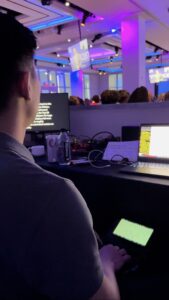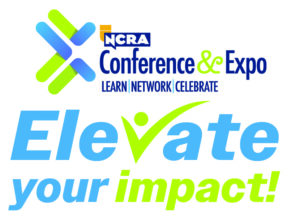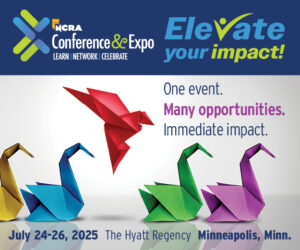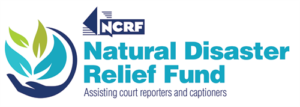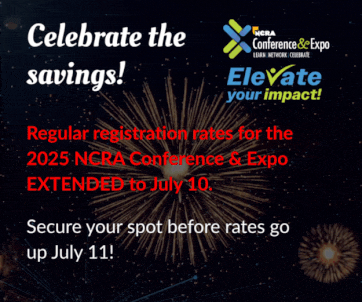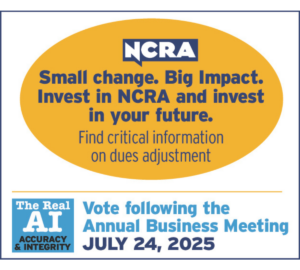By Jill Parker Landsman
Capping off a trilogy series, “Focus On…” Ask Me Anything ZoomUps, the Focus on Captioners Zoom presentation featured captioner panelists who provided firsthand insights about the work involved to be a successful captioner.
The audiences of captioning services many times are individuals who are deaf, hard of hearing, or viewers for whom English is a second language. Each panelist explained that this work consists of providing accurate, readable text in real time of what is spoken during events, classes, hearings, training sessions, or programs. Captions are usually displayed on a screen using conversion software,
NCRF Chair-Elect and the Ask Me Anything Task Force Co-Chair Meredith Bonn, RPR, CRR, moderated and introduced the panelists to those attending the Nov. 28 Zoomup. Presenters included Wendy Baquerizo; Joshua Edwards, RDR, CRR, CRC; Pat Graves, FAPR, RDR, CRR, CRC; Alan Peacock, FAPR, RDR, CRR, CRC; Stacey Potenza, CRC; and Kathryn A. Thomas, RDR, CRR, CRC.
The panelists emphasized that advance preparation is vital and noted that captioners are legally entitled to advance materials. Often when captioning in academic settings, Thomas said, “I get the syllabus. Many of the core classes I have done before. I try to get the class schedule plus the PowerPoints. I ask to be added as a class member to have access to materials and announcements.”
To caption sporting events, Thomas learns all that she can about each game: player names, team roster, player briefs, evacuation info and sections, expected batting chronologies, and pregame scripts, and she adds the words to her dictionary.
Search engines are a great resource, as well.“I Google a lot,” said Baquerizo. “If I am doing a class on photography, I will Google for photography terms. If it is an event, I check the event page.”
Applying the broader view, Edwards said learning how to write any word that you would ever hear, that is preparation. “When I was in school, I wrote every word in the dictionary. Accurately write what you hear. Write the countries of the world. Write Mount Kilimanjaro. Preparation is ongoing. It is your knowledge base,” he added.
Serving as both a court reporter and a captioner, Peacock advises that people take a specific discipline and stick with it. “I still do some reporting. You have to be careful about this. When you are a reporter, you are a verbatim reporter. That is your job. When you are captioning, there is a myth that you can drop words. The goal is to make it make sense,” he said. “Someone is going to be reading what you are saying, and you want the message conveyed. Captioning is still verbatim, but you do have a tiny bit of liberty to make it make sense.” Peacock also noted the importance of being conscientious and aware. “Is this in my dictionary. Am I doing this correctly? Captioning is more mindful. It is really a mindset.” Peacock said.
“Know thy audience,” cautions Graves. “For court reporting our ‘master’ is the record,” she said. “For captioning, your ‘master’ is the consumer. She listed the basic elements of captioning as readability, accessibility, and accuracy, first time and all the time. “I tell people on my team: When you forget who you are serving, then you are not doing a good CART job. Stay in your role. Remember why you are there. Court reporters have roles. Captioners have roles. They are driven by different consumers,” Graves said.
The panelists also noted that some employers require certifications and agreed advanced training, such as NCRA’s program, do elevate a captioner’s credentials.
Working in the accommodations department at JPMorgan Chase, Potenza provided this summary: “The better contracts, the higher paying contracts, certifications do matter.” Potenza said that her JPMorgan Chase team of accessibility service providers caption in English at more than 7,000 events each year.
Graves employs captioners who have earned NCRA’s CRC or CRR because she said she has confidence that those certification holders can manage the related testing. In addition, each of her employees is given a skills assessment as well.
Several panelists’ found that captioners’ financial compensation tracks about equally to that of a court reporters. Peacock said, “I do both, so I can tell you honestly. It works out about the same.” He explained that when covering a deposition, he calculates the travel time, arrival time, scoping, exhibit prep, etc., and computes the hourly wage. “It is around the same as what a captioner would make. The joy is that if you are a captioner and you do a job, you are done. You make a file. Look at conflicts. Look it over. And you are done.”
In captioning, it is rare that assignments can lead to what he called “a windfall” that can occur with court reporting jobs ordering multiple copies. When that happens, he said, “Can you make more in reporting? Yes. But otherwise, it is about the same.”
Thomas tracked her court reporting work in detail and was clear about her time invested at each assignment. Regarding her capture of time and expenses, she said, “I kept a spreadsheet when I was reporting. If I had a scopist, I would deduct that. Not every job has prep. It worked out almost exactly the same [as the captioning wage]. I am here to tell you that you can make some good money doing CART,” added Thomas, who works as an independent contractor.
Bonn posed the question about the pros and cons of captioning to give both sides of the work. Peacock pointed out that there can be dry spells that are expected but the pros outweigh that. “There are so many benefits. I enjoy being a captioner. I enjoy that you can make your own schedule. You can build your reputation as the best football captioner. Find your interest. I like the fact that you can do anything and learn,” he said ”It is cyclical work. It is feast or famine. Do not give up when it is dry. Summers are slow. Not that much programming. Learn to budget … especially if you are [saving in] your own IRAs. You have to learn to save.”
Traveling around the world is perhaps Graves’ favorite upside of her work. “I like that I can work when I want to. Work from home or travel the world. I have worked in thirty different countries,” she said. She also cautioned that captioners need to learn the formatting requirements of different captioning companies. “That is why a lot of captioners align with only a few companies. It is really no different than freelance court reporting,” she added.
Baquerizo finds the joy to be unrivaled. “I love working with the deaf and hard-of-hearing community. They make you feel like a superstar. They are so grateful for what you are doing. You are making a difference in their lives. One person told me, ‘This is the first time I have actually understood an entire class.’ This is life changing. And they cry. That is the biggest benefit to me. It is amazing,” she said.
Traumatizing experiences are common in court reporting settings. Captioners can have unsettling assignments, too. “I saw a post on Facebook asking how you handle those moments in court when things got gory or traumatizing. Somebody suggested that maybe CART is better if you want to avoid that type of material.” said Thomas.
“Once, I sat directly next to the cadaver in the cadaver lab, while my hard-of-hearing student was dissecting it. The cadaver was right here, [Thomas pointed next to her side] I could touch it. That was the most unusual job and the most fascinating job,” she added.
In the early 1990s, the Television Decoder Circuitry Act of 1990 bill was passed by U.S. Congress, allowing the Federal Communications Commission (FCC) to establish the rules for the implementation of closed captioning. The panelists discussed the details of these rules for their work. The FCC rules were set into motion the same year as the Americans with Disabilities Act.
Bonn announced that future Ask Me Anything ZoomUps are planned for 2024, such as vendor trainings by the major software providers. The next AMA ZoomUp will take place Jan. 30, 2024, and will focus on work-life balance.
To register for the next Ask Me Anything ZoomUp, click here.
Questions regarding NCRF or any of its programs can be submitted via email to NCRF Manager Jill Parker Landsman at jlandsman@ncra.org.

